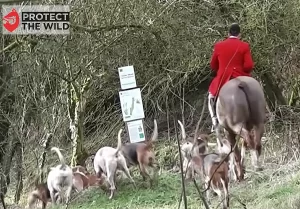Wildlife experts fear there are at least 100 badger baiters operating in the Midlands.
The evil gangs are killing thousands of the protected mammals for ‘fun’ in the cruelest of blood sports.
Many baiters are hardened city criminals, usually involved in drugs and firearm offences, who travel to the countryside to target the badgers.
Terry Spamer, a former RSPCA inspector who spent 17 years undercover investigating how the gangs operate, said the attacks are ‘thriving’ as police resources diminish.
Now his company Ruadan, based in Shropshire, is training others in surveillance techniques to help catch the thugs.
“Badger baiting – where badgers are dug out of their setts and then attacked with trained dogs – is not a ‘sport’ confined to some dim and shameful past,” said Mr Spamer.
“It is thriving in the British countryside.
“Yet badger persecution is one of the most difficult wildlife crimes to detect and just a handful of convictions are made each year.
“The odds are stacked against the investigator. The gangs are highly motivated, obsessively secretive and surveillance-aware.
“There is no current data on how many people are involved in badger baiting, and the police have no national system to collate intelligence.
“But, nationally, it is believed that there are around 2,000 people involved – and I would say this would include around 100 in the Midlands.”
Many of the badger baiters are from working class backgrounds and are also involved in other serious crimes, such as drugs and firearms, according to Mr Spamer.
“They are almost always from urban areas and travel to the countryside to commit the attacks,” he explained.
“And many told me that they expect to carry out a lifetime of digging without ever getting caught.
“Considering they often start in their teens and may kill two or three badgers per week, this equates to a level of cruelty probably unequalled by any other form of animal abuse in Britain.”
While working for the RSPCA, Mr Spamer infiltrated several badger baiting gangs.
“One assignment involved infiltrating gangs in the north-east,” he recalled.
“This meant I had to socialise with them – go the pub, play pool, share jokes, sometimes spend the night in their homes.
“It gave me an insight into the tactics they employed to avoid being caught.
“One individual would stash his equipment in the bushes and culverts near a sett a few days before a dig.
“If he was unlucky enough to be stopped by the police when returning to the site with his dogs, there would be nothing to incriminate him.
“He told me that he’d been stopped many times but was allowed to go on his way.”
Mr Spamer said that badger baiters follow a similar pattern once they arrive at a sett.
“They allow one dog, a Patterdale-type terrier, to pick a hole from which to enter the sett.
“The terrier wears an electronic transmitter on its collar, which enables the men to pinpoint its location underground.
“As the men shovel away the earth, the terrier prevents the badger from escaping.
“Badgers are powerful animals with a fearsome bite, and you’ve got to admire the terriers’ courage and tenacity.
“Some launch straight into their targets, suffering horrific injuries or death as a consequence.
“In many ways, they are as much victims of this activity as the badgers themselves.”
One recent case revealed how a badger baiter who had attacked animals in the Midland countryside was tracked down to Preston.
RSPCA officers were alerted from recent diggings and a trail of blood across a field in Westwood, Staffordshire, in January 2004.
A car belonging to Anthony Billington, 37, was spotted at the scene. It was later searched after forensic experts who had previously worked on the Soham murders carried out DNA testing of soil and pollen samples from the field.
The samples matched two soil-covered spades, one with badger hair attached, which were discovered along with bloodstained rags at Billington’s home in Preston.
He was found guilty of attempting to take a badger at Cannock Magistrates Court in February.
He was banned from keeping dogs for a year, banned from driving for six months, ordered to carry out 200 hours community service and pay £1,000 costs.
Badgers and their setts are protected by the Protection of Badgers Act 1992. Anyone who takes, kills or injures a badger or who interferes with a sett can be sent to prison for six months or fined up to £5,000.
But police have limited resources to deal with wildlife crime and the number of officers dedicated to these offences has dropped dramatically since the 1980s.
Responsibility now largely falls on groups such as the Royal Society for Prevention of Cruelty to Animals.
The RSPCA has a 12-strong team dedicated to combat the most serious cruelty crimes against animals, including badger baiting, dog and cock fighting.
“We rely on information from the public to catch these people who are historically difficult to track down,” said a spokesman.
“If anyone sees recently dug-over land or gangs of men with dogs and spades, it’s pretty obvious what is going on.
“This is a very cruel criminal activity and we would encourage more people to come forward if they suspect something is happening in their area.”
Mr Spamer added: “It is a sad indictment of wildlife law enforcement that most badger diggers are only caught when a landowner, farmer or walker stumbles across them by accident.
“What is needed is a multi-agency approach with police to make the National Wildlife Crime Unit more effective.
“It would also be responsible for collating, assessing and analysing intelligence and sharing the information with approved persons and organisations.
“I would also like to see the creation of a European crime enforcement working party, developing pro-active crime detection, exploring new initiatives and utilising all investigative tactics.”






